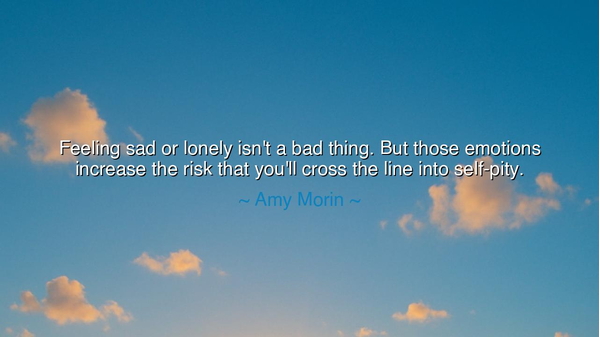
Feeling sad or lonely isn't a bad thing. But those emotions
Feeling sad or lonely isn't a bad thing. But those emotions increase the risk that you'll cross the line into self-pity.






The words of Amy Morin, “Feeling sad or lonely isn’t a bad thing. But those emotions increase the risk that you’ll cross the line into self-pity,” reveal one of the most subtle yet powerful truths of the human spirit — that emotion itself is not the enemy, but the way we dwell upon it can either strengthen or destroy us. Within these words lies a wisdom as old as philosophy itself: that sorrow, when honored with discipline, can be a teacher; but when indulged without purpose, becomes a chain. To be sad is to be human. To feel lonely is to be alive in a world that often moves faster than the heart. But to sink into self-pity is to turn one’s gaze inward so completely that the light of life, of gratitude, and of resilience fades from view.
In ancient times, the sages spoke of this balance. The Stoics, especially Epictetus, warned that emotions are natural movements of the soul, yet they must be guided by reason lest they consume us. They knew that grief could purify, but that self-pity could corrupt. To feel sadness is to open the door to understanding, but to pity oneself is to close it again and remain imprisoned inside. Amy Morin, in her modern wisdom, reminds us that the danger does not lie in feeling, but in feeding those feelings until they become self-centered suffering. It is not sorrow that destroys us — it is the refusal to rise from it.
Consider the story of Job from ancient scripture — a man who lost everything: wealth, health, and family. His sorrow was vast, his loneliness profound. Yet he did not let his suffering turn into bitterness. He mourned, but he did not wallow. He questioned, but he did not curse life itself. His faith kept him from the abyss of self-pity, the trap of believing that pain was proof of the world’s injustice. His story teaches that while sadness humbles the heart, self-pity poisons it. The former connects us to others; the latter isolates us in resentment and despair.
Loneliness, too, carries this same dual edge. When embraced with wisdom, it can lead to reflection, creativity, and spiritual awakening. The prophets, monks, and poets of old often withdrew into solitude not to indulge their pain, but to discover truth. Yet when loneliness is twisted by self-pity, it becomes a lament — “Why me?” — a cry that sees the self as victim rather than participant in the larger rhythm of life. Amy Morin’s warning is gentle but firm: beware the transformation of feeling into fixation. For when sadness becomes identity, the soul forgets its own power to heal.
Even in the world of modern history, this truth holds. Nelson Mandela, imprisoned for twenty-seven years, faced isolation deeper than most could imagine. Yet he refused to drown in self-pity. He accepted his suffering as a crucible for strength. “I learned that courage was not the absence of fear,” he wrote, “but the triumph over it.” He could have felt sorry for himself; instead, he turned his pain into purpose. Through his example, we see what Amy Morin means: that sadness and loneliness are natural, but to turn them inward too long is to lose the ability to rise.
The ancient philosophers would have said that self-pity is the corruption of sadness — an emotion once pure that has turned inward, stagnant, and self-absorbed. Sadness allows empathy; self-pity erases it. Sadness says, “I am hurting.” Self-pity says, “Only I am hurting.” The difference is vast, and yet the line between them is so thin that only awareness can keep us from crossing it. This is why Morin’s insight is both compassionate and cautionary. She does not tell us to avoid emotion — she calls us to master it, to feel fully without drowning in what we feel.
The lesson, then, is clear and timeless: feel deeply, but do not linger endlessly. Let your sadness teach you compassion, not despair. Let your loneliness lead you to understanding, not self-obsession. When you feel sorrow, honor it — but also ask, “What can this teach me? How can I grow from this?” For self-pity is a storm without movement, but reflection is the wind that carries the heart toward calm seas. Practice gratitude in your grief; reach out to others in your solitude. Remember that every emotion is a visitor — not a permanent resident of the soul.
And so, as Amy Morin reminds us, do not fear your sadness; it is proof that your heart still beats, still feels, still hopes. But guard against the voice that whispers that your pain is unique or unfair. For that is the voice of self-pity, and it steals not only your peace, but your strength. Be like the ancients — feel, reflect, and rise again. The storm will pass, but your wisdom, if earned through restraint and courage, will remain.






AAdministratorAdministrator
Welcome, honored guests. Please leave a comment, we will respond soon